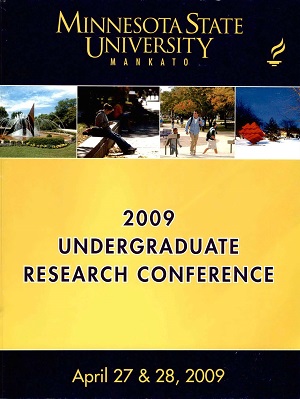College Students' Study Habits and Attitudes
Location
CSU Ballroom
Start Date
27-4-2009 1:00 PM
End Date
27-4-2009 3:00 PM
Student's Major
Psychology
Student's College
Social and Behavioral Sciences
Mentor's Name
Emily Stark
Mentor's Department
Psychology
Mentor's College
Social and Behavioral Sciences
Description
Previous research has found that gain and loss framed messages can be used successfully to motivate health-related behaviors, such as using sunscreen or getting regular mammograms. These messages either emphasize the rewards of engaging in a behavior or the costs of not engaging in the behavior. The current research examines whether or not framed messages can be used to help motivate student behaviors related to academic success, such as increased studying for exams. A gain-framed message would emphasize the benefits to be gained through increased studying time and use of textbook or other resources, whereas a lossftamed message would emphasize the consequences of not studying more or using available resources. Results showed that students with high test anxiety were more motivated by the loss-framed message, whereas those who were more confident in their abilities were more motivated by the gain-framed message. Understanding how to motivate students to improve their study habits and their attitudes towards exams will provide essential and useful knowledge to students, as well as to campus centers (the Center for Academic Success) that work with students on academic topics.
College Students' Study Habits and Attitudes
CSU Ballroom
Previous research has found that gain and loss framed messages can be used successfully to motivate health-related behaviors, such as using sunscreen or getting regular mammograms. These messages either emphasize the rewards of engaging in a behavior or the costs of not engaging in the behavior. The current research examines whether or not framed messages can be used to help motivate student behaviors related to academic success, such as increased studying for exams. A gain-framed message would emphasize the benefits to be gained through increased studying time and use of textbook or other resources, whereas a lossftamed message would emphasize the consequences of not studying more or using available resources. Results showed that students with high test anxiety were more motivated by the loss-framed message, whereas those who were more confident in their abilities were more motivated by the gain-framed message. Understanding how to motivate students to improve their study habits and their attitudes towards exams will provide essential and useful knowledge to students, as well as to campus centers (the Center for Academic Success) that work with students on academic topics.
Recommended Citation
VanDenBerg, Kaley. "College Students' Study Habits and Attitudes." Undergraduate Research Symposium, Mankato, MN, April 27, 2009.
https://cornerstone.lib.mnsu.edu/urs/2009/poster-session-B/10




